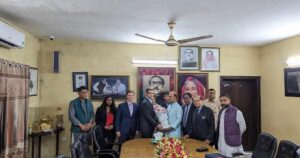
The United States Institute of Peace on Friday wanted to know from the ruling Awami League about the government’s position over the conflict between India and China.
AL international affairs secretary Shammi Ahmed shared this with reporters after a meeting between the AL and the USIP, an independent nonpartisan national institution established and funded by Congress, at AL president and prime minister’s political office at Dhanmondi in the Dhaka city.
‘They wanted to know about the Awami League’s position over the China-India conflict over the Arunachal border. We told them about our foreign policy dictum—friendship to all and malice to none. We do not want to make interference in any country’s internal matters,’ Shammi said, adding that the team also inquired about the government’s economic partnership with China, an emerging economic power.
She said that they wanted to know about the political tension in the subcontinent and the Bangladesh government and AL’s role in this regard.
According to the AL, the USIP three-member team consisting of its visiting expert for South Asia Region Geoffrey Macdonald, senior adviser on South Asia Dan Markey and South Asia Programme research analyst Isha Gupta were present at the meeting.
Speaking about India, Shami said that India was a tested friend and Bangladesh was sharing a large portion of its border with India and that India also helped the country’s people during the War of Liberation in 1971.
She said that they also wanted to know about the AL’s position over the rise of Hinduism in India.
‘We do not want to say anything about their internal matter. We give respect to theories of other countries. Things that are happening in China and India are the matters of those countries,’ she claimed to have told the USIP team.
She said that AL wanted to resolve everything through discussion not through war following the foreign policy of the country’s founding president Sheikh Mujibur Rahman.
AL presidium member Muhammad Faruk Khan and advisory council member Enam Ahmed Chowdhury, among others, were present at the meeting.
The USIP was established by Congress in 1984 as an independent institution devoted to the nonviolent prevention and mitigation of deadly conflict abroad.
New Age









